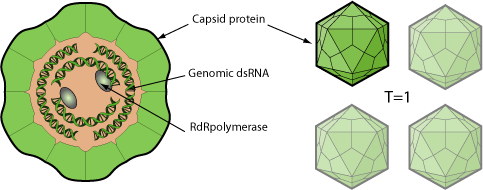Chrysoviridae (taxid:249310)
VIRION

Non-enveloped capsid with T=1 icosahedral symmetry and composed of 60 protein subunit monomers. However, each subunit is thought to contain two genetically duplicated domains, and these 120 putative domains might therefore adopt a pseudo-T=2 structure. The capsid is about 35-40 nm in diameter. The four genomic segments are encapsidated separately.
GENOME
Segmented linear dsRNA genome about 12.5 kb: 4 segments encoding for 4 proteins.
GENE EXPRESSION
Each genomic segment encodes for a single protein. Translation is initiated on a unique internal ribosome entry site (IRES) element situated at the 5'-UTR.
ENZYMES
- RNA-directed RNA polymerase [RdRp]
- No capping activity [IRES]
REPLICATION
CYTOPLASMIC
- Virus penetrates into the cytoplasm.
- Transcription of the dsRNA genome by viral polymerase occurs inside the virion, so that dsRNA is never exposed to the cytoplasm. This plus-strand transcript is used as template for translation.
- (+)RNAs are encapsidated in virion particle, in which they are transcribed to give RNA (-) molecules with which they become base-paired to produce dsRNA genomes.
- Mature virions are transmitted to new cell by cytoplasmic exchange, sporogenesis or Hyphal anastomosis.
Matching UniProtKB/Swiss-Prot entries
(all links/actions below point to uniprot.org website)4 entries grouped by strain
4 entries
Penicillium chrysogenum virus (isolate Caston/2003) (PcV) reference strain
Alphachrysovirus cerasi taxid:284687
| Protein | ModelArchive |
| Putative coat protein | ma-jd-viral-11748 |
| Putative protease | ma-jd-viral-21412 |
| RNA-directed RNA polymerase (EC 2.7.7.48) | ma-jd-viral-19872 |
| Uncharacterized protein | ma-jd-viral-52117 |
Fusarium oxysporum f. sp. dianthi mycovirus 1 taxid:1679238
Isaria javanica chrysovirus 1 taxid:1930960
| Protein | ModelArchive |
| Capsid protein | ma-jd-viral-11746 |
| Putative protease | ma-jd-viral-21416 |
| RNA-directed RNA polymerase (EC 2.7.7.48) | ma-jd-viral-19867 |
| Uncharacterized protein | ma-jd-viral-18773 |
Magnaporthe oryzae chrysovirus 1 taxid:764348
Penicillium chrysogenum virus (isolate Caston/2003) taxid:654932
Penicillium janczewskii chrysovirus 1 taxid:1755792
| Protein | ModelArchive |
| 70 kDa protein | ma-jd-viral-21428 |
| 80 kDa protein | ma-jd-viral-55903 |
| 84 kDa protein | ma-jd-viral-40134 |
| RNA-directed RNA polymerase (EC 2.7.7.48) | ma-jd-viral-18895 |
